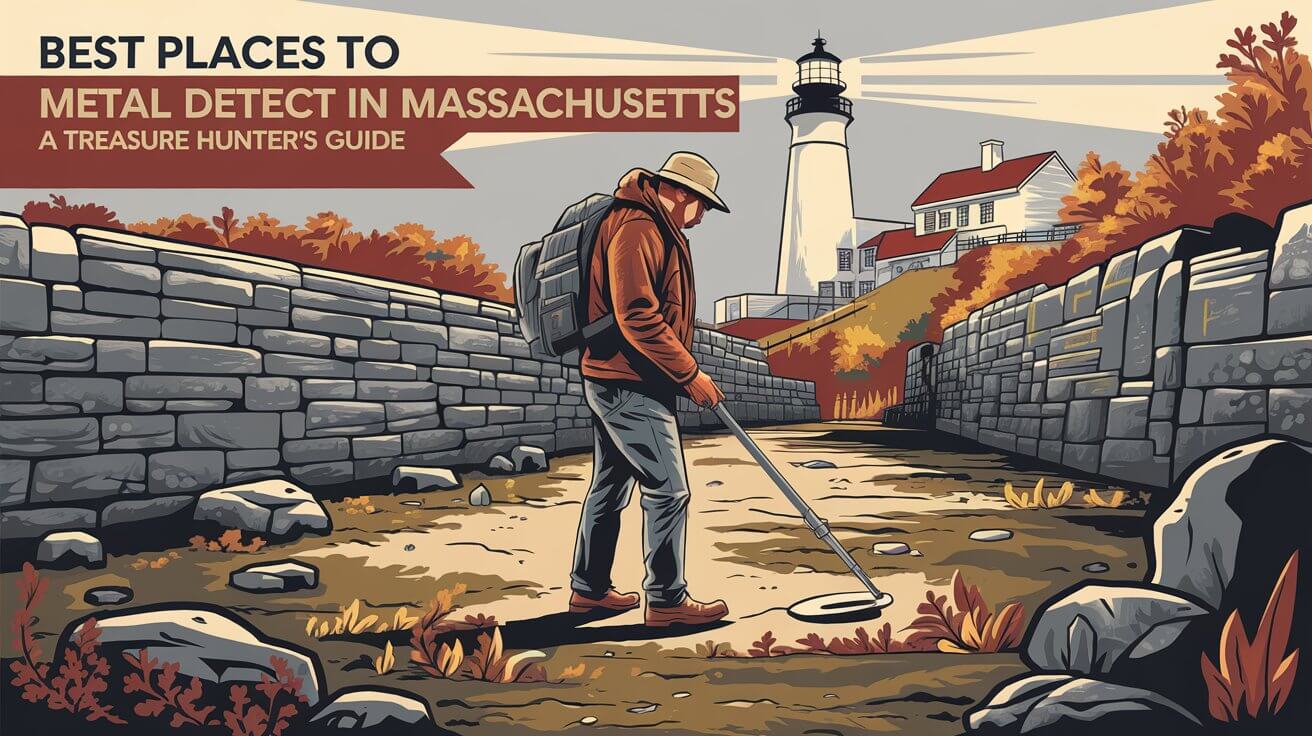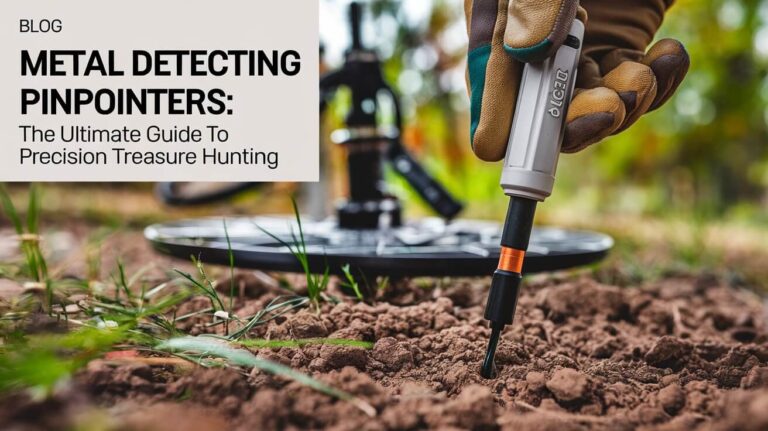
Massachusetts offers a wealth of opportunities for metal detecting enthusiasts. From historic beaches to colonial-era sites, the Bay State is a treasure trove for those seeking to uncover hidden relics and valuable finds. This guide will explore the top locations, legal considerations, and essential tips for metal detecting across Massachusetts.
Understanding Metal Detecting Laws in Massachusetts
Before you grab your metal detector and head out, it’s crucial to know the rules of the game. Massachusetts has specific regulations that all detectorists must follow.
State Regulations
In Massachusetts, metal detecting is generally allowed in state parks and beaches. However, you’ll need to check with local authorities first. Some key points to remember:
- Always get permission before detecting on private property
- Avoid disturbing wildlife or plant life
- Fill in any holes you dig
Federal Laws Affecting Metal Detecting
The National Historic Preservation Act impacts metal detecting in Massachusetts. This law protects historical artifacts over 100 years old. If you find something that might be historically significant, leave it in place and report it to park officials.
Permits and Permissions
While not always required, it’s a good idea to check if you need a permit for the area you plan to search. Some towns and cities might have their own rules. When in doubt, ask local officials or park rangers.
Top Beaches for Metal Detecting in Massachusetts
Massachusetts boasts some fantastic beaches for metal detecting. Here are some prime spots to explore:
Revere Beach
Just north of Boston, Revere Beach is America’s first public beach. It’s a great place to find modern jewelry and coins lost by beachgoers. The best times to hunt are early morning or after a storm.
Crane Beach
Located in Ipswich, Crane Beach offers miles of pristine sand. It’s not just good for sunbathing – metal detectorists often find interesting items here. The beach’s history dates back to colonial times, so you never know what you might uncover.
Salisbury Beach
This popular spot near the New Hampshire border can be a gold mine for detectorists. With its long stretch of sand and many visitors, there’s always a chance of finding something valuable.
Nantasket Beach
South of Boston, Nantasket Beach in Hull is another excellent location. Its popularity means plenty of lost items to discover. The beach has been a vacation spot for over a century, adding to its potential for historical finds.
State Parks and Forests for Metal Detecting Adventures
Massachusetts state parks offer diverse landscapes for metal detecting. Here are some top picks:
Nickerson State Park
Located on Cape Cod, Nickerson State Park spans nearly 2,000 acres. With its campgrounds and hiking trails, it’s a great spot for a weekend detecting trip. Remember to get permission from park officials before you start.
Halibut Point State Park
This park in Rockport offers rocky coastline and stunning views. While detecting, you might find relics from its quarrying past. Always be careful on the rocky terrain.
Lynn Woods Reservation
As one of the largest municipal parks in the United States, Lynn Woods Reservation offers plenty of ground to cover. It’s rich in history, with sites dating back to colonial times.
October Mountain State Forest
The largest state forest in Massachusetts, October Mountain offers diverse terrain for detecting. From old farmsteads to abandoned trails, there’s no shortage of potential hotspots.
Historic Sites for Metal Detecting in Massachusetts
Massachusetts is steeped in history, offering unique opportunities for metal detecting enthusiasts.
Salem and Gallows Hill
Famous for the witch trials of 1692, Salem is a treasure trove of historical artifacts. Gallows Hill, in particular, holds significant historical value. Always respect local regulations and report any significant finds.
Plymouth Area
As the landing site of the Pilgrims, Plymouth and its surrounding areas are rich in colonial history. While many sites are protected, there are still areas where detecting is allowed with proper permissions.
Lexington and Concord
These towns played crucial roles in the American Revolution. While many battlefields are off-limits, nearby areas might yield interesting finds from that era.
Deerfield
This western Massachusetts town has a long history dating back to Native American settlements. Its fields and surroundings could hold artifacts from various periods.
Urban Metal Detecting Spots in Massachusetts
Don’t overlook urban areas for metal detecting. Many cities in Massachusetts have parks and public spaces with potential.
Boston Common and Public Garden
America’s oldest public park, Boston Common, has centuries of history beneath its surface. Always check local regulations before detecting in city parks.
Springfield’s Forest Park
One of the largest urban parks in the country, Forest Park in Springfield offers diverse detecting opportunities. From old picnic grounds to former zoo areas, there’s plenty to explore.
Worcester’s Elm Park
Elm Park in Worcester is another historic urban park worth checking out. Its long history as a public space increases the chances of interesting finds.
Lowell’s Boarding House Park
This park in Lowell celebrates the city’s industrial heritage. While detecting, you might uncover items related to its mill-working past.
Metal Detecting Clubs and Communities in Massachusetts
Joining a club can enhance your metal detecting experience in Massachusetts.
Benefits of Joining a Club
Metal detecting clubs offer:
- Shared knowledge and tips
- Group outings and events
- Updates on laws and regulations
Notable Massachusetts Metal Detecting Clubs
Some clubs to consider include:
- The Bay State Treasure Hunters Club
- Yankee Territory Coinshooters
- Silver City Treasure Seekers
These groups can provide valuable local insights and camaraderie.
Essential Equipment for Metal Detecting in Massachusetts
Having the right gear can make a big difference in your detecting success.
Choosing the Right Metal Detector
For Massachusetts conditions, consider:
- Waterproof detectors for beach hunting
- Detectors with good discrimination for trashy urban areas
- Lightweight models for long hikes in state parks
Additional Tools and Accessories
Don’t forget:
- A sturdy digging tool
- Sand scoop for beach hunting
- Headphones to block out noise
- A finds pouch to store your discoveries
Tips for Successful Metal Detecting in Massachusetts
Maximize your chances of success with these tips:
Research and Planning
- Study local history to identify promising areas
- Check tide tables when beach hunting
- Look for old maps to find forgotten sites
Best Seasons for Metal Detecting
- Spring and fall offer comfortable temperatures
- Winter can be good for beach hunting after storms
- Summer is great for water hunting, but beaches may be crowded
Etiquette and Responsible Detecting
- Always fill your holes
- Dispose of trash you dig up
- Respect private property and “No Trespassing” signs
- Share your historically significant finds with local museums
Interesting Finds from Massachusetts Metal Detecting
Massachusetts detectorists have made some fascinating discoveries over the years.
Colonial Artifacts
Items from the colonial era are prized finds. Detectorists have uncovered:
- Old coins like Pine Tree Shillings
- Buckles and buttons from 17th and 18th-century clothing
- Musket balls and other military artifacts
Native American Relics
While it’s important to respect Native American sites, some areas may yield:
- Arrowheads (though these are typically found through surface hunting)
- Trade beads
- Stone tools
Civil War Era Discoveries
The Civil War left its mark on Massachusetts. Detectorists have found:
- Union Army buttons and insignia
- Bullets and cartridges
- Personal items from soldiers
Challenges and Considerations for Metal Detecting in Massachusetts
Metal detecting in Massachusetts comes with its own set of challenges.
Crowded Areas and Competition
Popular spots can get busy, especially in summer. To avoid crowds:
- Detect early in the morning
- Explore less-known areas
- Be courteous to other detectorists you encounter
Dealing with False Signals
Massachusetts soil can be mineralized, leading to false signals. To combat this:
- Learn your detector’s settings
- Practice ground balancing
- Be patient and methodical in your searching
Preserving Historical Integrity
Massachusetts has a rich history that needs protecting. Always:
- Report significant historical finds
- Avoid detecting on known archaeological sites
- Support local historical societies with your discoveries
Metal detecting in Massachusetts offers a unique blend of history, natural beauty, and the thrill of discovery. From the shores of Cape Cod to the forests of the Berkshires, the Bay State has something for every kind of detectorist. Remember to always follow local laws, respect the environment, and preserve historical artifacts for future generations. Happy hunting!






